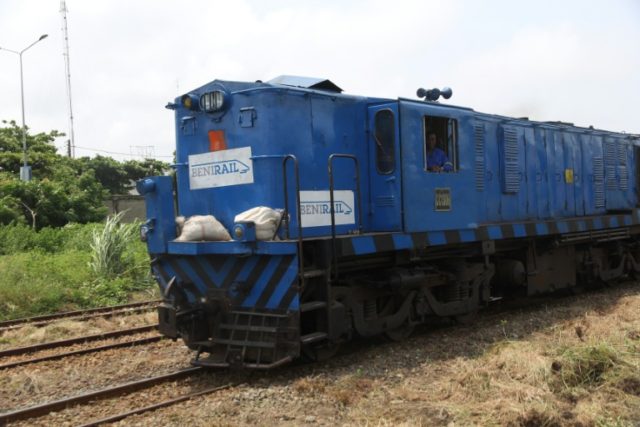Cotonou (AFP) – At the old train station in Benin’s economic capital Cotonou, a rundown locomotive imported from France in the 1960s arduously roars to life, ready to haul 600 tonnes of goods to an inland city.
“If it doesn’t break down, it will get there in 12 hours,” says Marcel Agon, who has been stationmaster since 1985, about the 430 kilometre (270 mile) trip to Parakou.
Only 20 good trains leave the small terminus each month, yet a fine new regional express passenger train with blue seats and bright paintwork, also from France, has never rolled out of Cotonou.
When French industrial giant Bollore took Benin’s rail network in hand in April 2014, railway employees thought things were getting back on track, until a court stopped work the next year. It upheld a complaint from a Beninese businessman with his own plans to knock the railroad back into shape.
Now Benin’s new businessman president has promised to find a solution to the conflicting interests that have blocked the hopes of modern rail transport.
“We are going to get out of this hornet’s nest soon,” President Patrice Talon recently told journalists.
– Going off the rails –
It was in November 2013 that the heads of state of little Benin and landlocked Niger to the north initially decided to establish Benirail, a multinational firm with Bollore as a strategic partner.
In barely three months, Bollore Africa Logistics (BAL) renovated the station, paid wage arrears and imported track to link Cotonou with Niger’s capital Niamey, with further plans to extend the railway to Burkina Faso and Togo and on to Abidjan in Ivory Coast.
The aim was to kickstart growth in five of the world’s poorest countries in West Africa.
Railroads came to Benin, then called Dahomey, in 1936. But like other African nations the railway was just internal. No significant international network exists except in South Africa.
BAL’s start however was a bit too fast for its Beninese rival, millionaire businessman Samuel Dossou, CEO of Petrolin, who had his own rail plans and filed a suit against Bollore.
This is “a project that he started himself and paid out of his own pocket for the studies,” Dossou’s wife and Petrolin board member Claudine Afiavi Prudencio said at the time.
The days when “people can trample on the rights of Beninese businessmen in their homeland are over,” she added.
Indeed, BAL had no legal authorisation to begin work. In a ruling handed down on November 19, 2015, the Cotonou court of appeal upheld Dossou’s complaint and ordered “the end of all work undertaken” immediately.
Dossou has been trying to take charge of the rail network in the former French colony since 2004, the year the state relaxed its grip on the OCBN (Joint Benin-Niger Organisation of Railways and Transports).
But for lack of funds, no tenders were honoured until 2010, when Dossou and the two states finally negotiated to integrate a rail network. Studies were carried out, but came to nought, according to Gustave Sonon, a former minister of public works.
“Dossou didn’t have the resources,” Sonon said.
“When I went into government, I had a choice between allowing Bollore to continue or totally blocking the project,” the former minister told AFP. “Good progress had been made and for that reason I pushed things on a bit.”
– Oxidising in the sun –
But since the court brought work to a halt last year, a huge stock of new track intended to cover a distance of 500 kilometres (310 miles) has been lying in Cotonou, oxidising in the sun.
Across the border in Niger the Bollore group has begun to lay 150 kilometres of track in the vast and partly desert nation, which sorely needs access to the sea, and is threatening to bypass Benin.
“They are threatening to build a railway through Togo and abandon the port of Cotonou if Benin doesn’t choose Bollore,” said a source close to the case, who added that “in any event, everything will be negotiated in Paris.”
Both Petrolin and BAL declined to comment when contacted by AFP.
But Talon, a cotton tycoon who was elected president with 65 percent of the vote and took office in April, declared that negotiations were under way when he gave a press conference after returning from Paris, where he had talks with industrial magnate Vincent Bollore.
“What has been done up until now has many flaws because it was done in haste,” Talon admitted, but insisted the impasse would end soon.
Marcel Agon, the elderly stationmaster, sure hopes that a working compromise can be reached — before his retirement in the next two or three years.
“God willing, before I retire, I shall see this station full of passengers and my country moving forward,” he says as the rusty old goods train trundles towards the horizon.

COMMENTS
Please let us know if you're having issues with commenting.